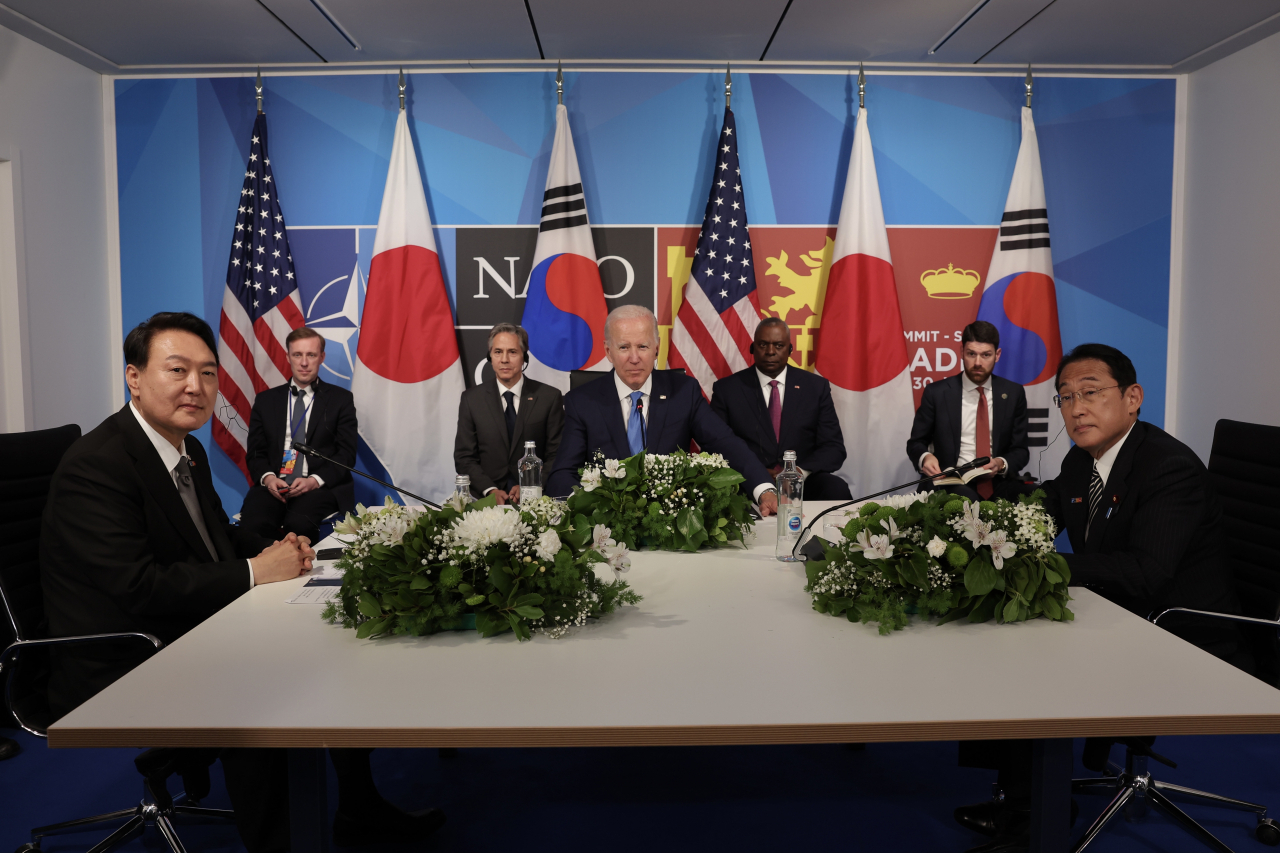3-way summit to focus on 'real-time' military information sharing: experts
Discussion on Japan's participation in Korea-US Nuclear Consultative Group unlikely
By Shin Ji-hyePublished : May 18, 2023 - 15:38

President Yoon Suk Yeol is set for a trilateral summit with the leaders of the United States and Japan on Sunday, where the focus of the meeting is expected to be on enhancing real-time information sharing to effectively tackle persistent North Korean missile threats, according to experts.
Six months after their previous meeting in November, the three leaders will resume talks on the last day of the G-7 summit which kicks off on Friday. The last summit in Phnom Penh, Cambodia, resulted in the three leaders signing a joint agreement on the sharing of North Korean missile warning information. The presidential office recently announced that their respective military authorities have been engaged in working-level discussions to develop a system, and the three countries have plans to promptly establish a trilateral consultative body to facilitate the real-time sharing of North Korean missile warning information. The warning information includes details such as the launch point, flight direction and potential landing location of a missile.
Such a real-time missile information sharing system is a necessity at this point, according to Yang Uk, a military and defense analyst at the Asan Institute for Policy Studies.
He said that information sharing between South Korea and Japan has not been smooth, despite the recent normalization of the General Security of Military Information Agreement. GSOMIA is considered "a basic pact" and does not imply information sharing itself, he explained. It is an agreement that allows countries to share military information. South Korea has concluded intergovernmental military information agreements with 21 countries, including Japan.
"To enable information sharing, specific plans must be drawn up, determining which ministries, channels and technical means will be used for sharing information," Yang said.
“While information sharing between the US and Korea, as well as between the US and Japan, tends to be prompt during instances of North Korean provocations, the information sharing between Korea and Japan is not as well-established and smooth.”
Establishing "real-time" information sharing is also important because GSOMIA and the trilateral information sharing arrangement, TISA, occur "after" missiles are launched, according to Choi Eun-mi, a research fellow at the Asan Institute for Policy Studies.
Even if the information sharing system, such as GSOMIA and TISA, operate well, Choi said that the countries still need to analyze information after North Korea launches missiles.
"Currently, missile information provided by Japan and South Korea differs depending on the direction in which the North fires, and there are occasional inaccuracies," she explained. "Considering that missiles from the North can arrive in Seoul within minutes, promptness and accuracy of information are crucial."
Much attention has been given to whether Japan will participate in the Korea-US Nuclear Consultative Group, as President Yoon mentioned during a joint press briefing with Japanese Prime Minister Fumio Kishida earlier this month that he does not rule out Japan's future participation in consultations. The nuclear consultation group guarantees South Korea's participation in the process of US extended deterrence in the case of emergencies, such as the threat of North Korean nuclear missiles.
However, experts predicted that the leaders would not extensively discuss this matter during the summit, although such discussions may be initiated.
“The essence of Yoon’s words at the time was in the next sentence, that the nuclear consultative group is a ‘bilateral’ agreement between Korea and the US,” Choi said. She expressed doubt about the merit of a transition to a multilateral agreement.
Cheong Seong-chang, the director of the Department of Reunification Strategy Studies at the Sejong Institute, said, "The NCG between Korea and the US has not even been officially launched, so making a sudden decision at the G-7 summit seems to be impossible."
"The NCG is a sort of gift given to Yoon by President Joe Biden. The reason the US agreed to grant it to South Korea is to address the demand for nuclear armament in Korea. However, Japan does not have the same demand for nuclear armament as Korea," Cheong said.
"Nevertheless, Japan can express its intention to participate in the NCG in the long term, so further discussion is necessary,” he said. “The US wants Korea-Japan relations to be like Korea-US or US-Japan. If Japan makes such a proposal, the US will consider it positively, even if it cannot accept it right away.”
In a regular briefing on May 8, Vedant Patel, senior deputy spokesman for the US State Department, responded to a question about the possibility of creating a new Korea-US-Japan consultative body on extended deterrence, saying, “We, of course, welcome increased collaboration between our partners in the ROK and our partners in Japan, as well as increased (trilateral) collaboration, as well. We believe all of these things are good for all three of our countries.”



















![[Today’s K-pop] Treasure to publish magazine for debut anniversary](http://res.heraldm.com/phpwas/restmb_idxmake.php?idx=642&simg=/content/image/2024/07/26/20240726050551_0.jpg&u=)